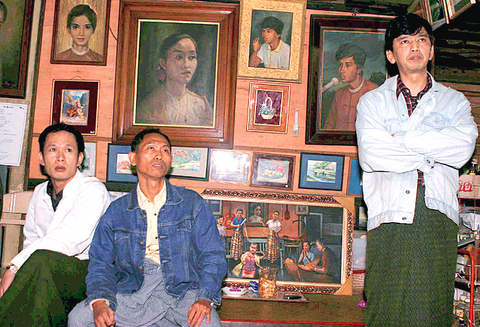Myanmar's military junta released five high-profile dissidents yesterday that it arrested in September at a time of intensifying international pressure on the ruling generals to take concrete steps on the road to democracy.
Their release by the military rulers, who also freed 40 political detainees last week as part of a mass prisoner release to mark the 59th anniversary of independence from British rule, was sudden and unexpected.
"We were all sent back home at about 1:30am this morning," said Min Ko Naing, a leader of a pro-democracy student uprising in 1988.

PHOTO: EPA
He confirmed that he and his colleagues were in good health.
Asked why he thought they had been released, he said: "As we all know, it is mounting pressure at the UNSC," referring to US efforts to have the UN Security Council put pressure on the generals.
Anti-junta pressure groups agreed the release was timed to deflect attention from efforts by the US to get the Security Council to press Myanmar this week into easing repression and beginning a promised transition to democracy.
"This looks like nothing but a cynical ploy to stop the UN Security Council from taking action," said Aung Din, policy director of the Washington-based US Campaign for Burma.
The US on Tuesday introduced a draft resolution to the Security Council urging Myanmar's rulers to initiate democratic reforms, release all political prisoners and stop using rape as a weapon of war.
The other freed activists are Ko Ko Gyi, Ko Htay Kywe, Ko Pyone Cho and Ko Min Zeya, all of whom played prominent roles in the nationwide 1988 protests in which several thousand people were killed after the army moved in to quell the dissent.
Since 1988, each has spent between nine and 15 years behind bars. Within the country, they are viewed as the most prominent anti-junta figures after opposition leader Aung San Suu Kyi, the Nobel Peace laureate who is under house arrest.
"Ko Htay Kywe and I were kept at the same place but in different buildings. We came to know that we were there together only after our release," Naing said.
"The rest were kept somewhere else. But we all were treated well," he said.
"We are determined to keep on working for the emergence of national reconciliation and democracy in our country through dialogue. We will continue all our campaigns," he said.
The present junta suffered a landslide election defeat to Suu Kyi's National League Democracy in 1990, but ignored the result.

PRECARIOUS RELATIONS: Commentators in Saudi Arabia accuse the UAE of growing too bold, backing forces at odds with Saudi interests in various conflicts A Saudi Arabian media campaign targeting the United Arab Emirates (UAE) has deepened the Gulf’s worst row in years, stoking fears of a damaging fall-out in the financial heart of the Middle East. Fiery accusations of rights abuses and betrayal have circulated for weeks in state-run and social media after a brief conflict in Yemen, where Saudi airstrikes quelled an offensive by UAE-backed separatists. The United Arab Emirates is “investing in chaos and supporting secessionists” from Libya to Yemen and the Horn of Africa, Saudi Arabia’s al-Ekhbariya TV charged in a report this week. Such invective has been unheard of

US President Donald Trump on Saturday warned Canada that if it concludes a trade deal with China, he would impose a 100 percent tariff on all goods coming over the border. Relations between the US and its northern neighbor have been rocky since Trump returned to the White House a year ago, with spats over trade and Canadian Prime Minister Mark Carney decrying a “rupture” in the US-led global order. During a visit to Beijing earlier this month, Carney hailed a “new strategic partnership” with China that resulted in a “preliminary, but landmark trade agreement” to reduce tariffs — but

Chinese President Xi Jinping’s (習近平) purge of his most senior general is driven by his effort to both secure “total control” of his military and root out corruption, US Ambassador to China David Perdue said told Bloomberg Television yesterday. The probe into Zhang Youxia (張又俠), Xi’s second-in-command, announced over the weekend, is a “major development,” Perdue said, citing the family connections the vice chair of China’s apex military commission has with Xi. Chinese authorities said Zhang was being investigated for suspected serious discipline and law violations, without disclosing further details. “I take him at his word that there’s a corruption effort under

China executed 11 people linked to Myanmar criminal gangs, including “key members” of telecom scam operations, state media reported yesterday, as Beijing toughens its response to the sprawling, transnational industry. Fraud compounds where scammers lure Internet users into fake romantic relationships and cryptocurrency investments have flourished across Southeast Asia, including in Myanmar. Initially largely targeting Chinese speakers, the criminal groups behind the compounds have expanded operations into multiple languages to steal from victims around the world. Those conducting the scams are sometimes willing con artists, and other times trafficked foreign nationals forced to work. In the past few years, Beijing has stepped up cooperation